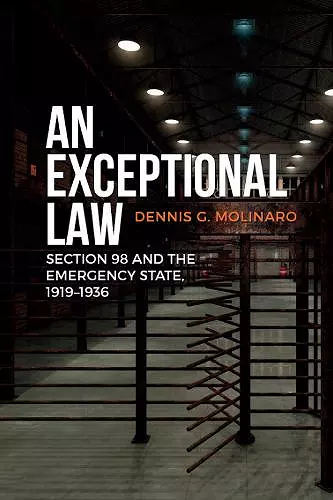An Exceptional Law
Section 98 and the Emergency State, 1919-1936
Format:Paperback
Publisher:University of Toronto Press
Published:13th Apr '17
Currently unavailable, and unfortunately no date known when it will be back
This paperback is available in another edition too:
- Hardback£58.00(9781442629578)

"This superb examination of Canada's storm-tossed years between the wars proposes a fresh interpretation of the harshly repressive and sometimes lethal legislation designed to discipline immigrants, punish radicals, and shape public opinion. Twenty-first-century readers will encounter in its pages a haunting premonition of the insecurity state that, ever since 9/11, has made dissent difficult - yet all the more necessary. This book is an indispensable addition to our understanding of freedom and repression in twentieth-century Canada." -- Ian McKay, Director of the Wilson Institute for Canadian History, McMaster University "An Exceptional Law is an important addition to the scholarly literature on several subfields of Canadian history. Dennis G. Molinaro's scholarship is excellent." -- Jim Mochoruk, Chester Fritz Distinguished Professor, University of North Dakota
An Exceptional Law showcases how the emergency law used to repress labour activism during the First World War became normalized with the creation of Section 98 of the Criminal Code, following the Winnipeg General Strike.
During periods of intense conflict, either at home or abroad, governments enact emergency powers in order to exercise greater control over the society that they govern. The expectation though is that once the conflict is over, these emergency powers will be lifted.
An Exceptional Law showcases how the emergency law used to repress labour activism during the First World War became normalized with the creation of Section 98 of the Criminal Code, following the Winnipeg General Strike. Dennis G. Molinaro argues that the institutionalization of emergency law became intricately tied to constructing a national identity. Following a mass deportation campaign in the 1930s, Section 98 was repealed in 1936 and contributed to the formation of Canada’s first civil rights movement. Portions of it were used during the October Crisis and recently in the Anti-Terrorism Act of 2015. Building on the theoretical framework of Agamben, Molinaro advances our understanding of security as ideology and reveals the intricate and codependent relationship between state-formation, the construction of liberal society, and exclusionary practices.
"An Exceptional Law: Section 98 & The Emergency State 1919-1936 is a very readable, incredibly well-researched study of Canada’s wartime-derived, but peacetime-continued sedition laws of early 20th century. But the book is of much more than historical interest. As they said in Battlestar Galactica: All this has happened before and will happen again. My copy is marked-up where I noted parallels to current immigration and anti-terror laws. … I highly recommend this book."
-- Craig Forcese * #Sundayscholar Pick, Twitter, Posted May 21, 2017 *‘A meticulously researched and well-written historical piece…. For those interested in political rights and the extent the public allows governments to determine what is and is not acceptable in the political sphere, An Exceptional Law is an excellent read.’
-- Michael Marschal * Saskatchewan Law Review vol 81: 2018 *"Dennis Molinaro has rooted his account of Section 98 [of Canada’s Criminal Code] in the story of the liberal state’s penchant to betray liberty…His book is also an intervention in the current debate about emergency legislation in Canada."
-- Tom Mitchell * Labour/Le Travail Vol 81:2018 *"Until now, the notorious law [Section 98 of the Criminal code], which allowed for, among other things, guilt by association, has lacked a proper study. Fortunately, a valuable examination of the legislation, the background to its creation, its impact, and its continuation at least in part even after the law’s repeal has been provided in this fascinating and well-researched account."
-- Steve Hewitt, University of Birmingham * The Canadian Historical Review vol. 99 no. 3, 2018 *"Molinaro has produced what will become the standard analysis of one of the most infamous pieces of legislation in Canadian history."
-- R. Blake Brown, Saint Mary's University * American Historical Review, April 20- Short-listed for Canadian Law and Society Association Book Prize 2018 (Canada)
ISBN: 9781442629585
Dimensions: 216mm x 140mm x 25mm
Weight: 460g
352 pages